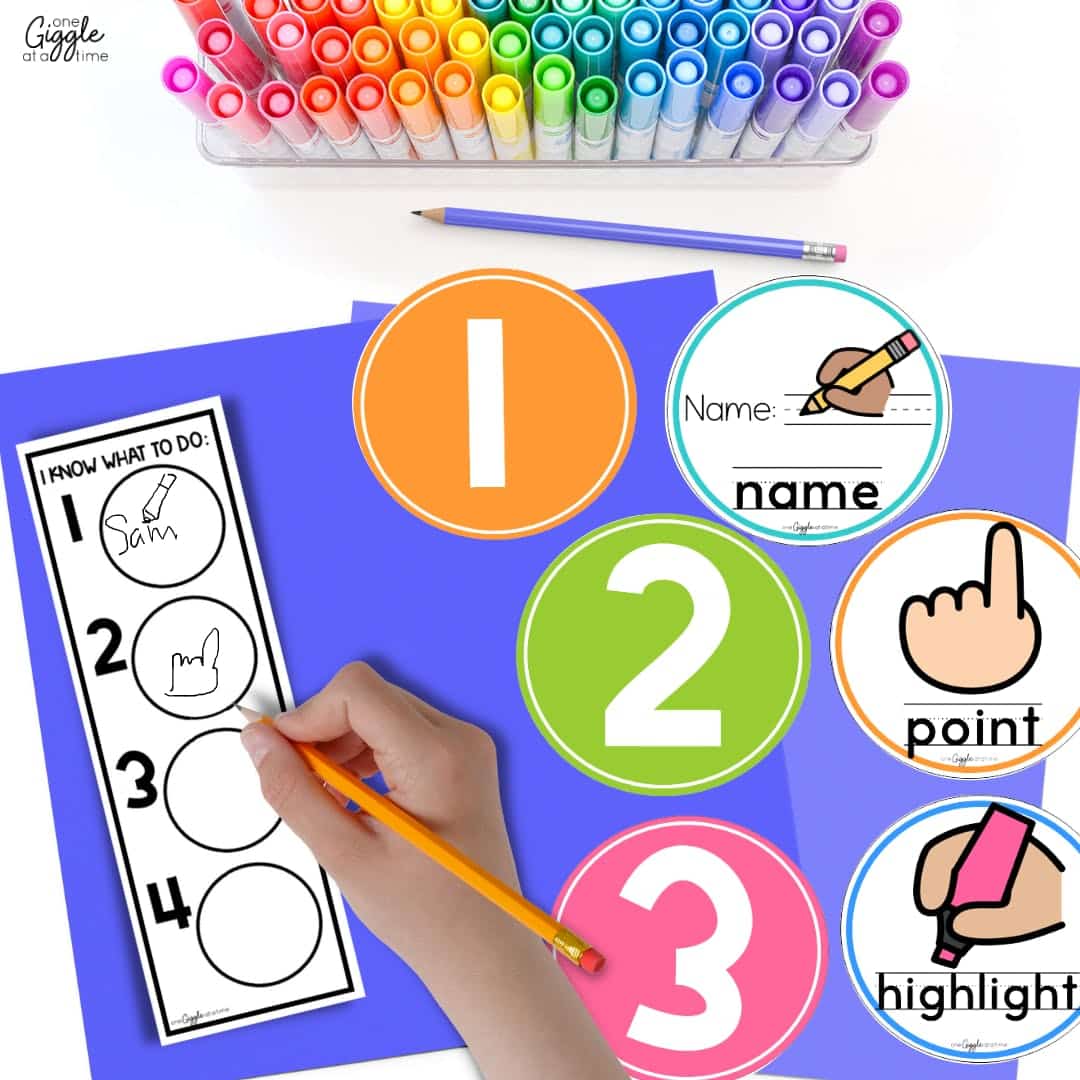
EASY Action Steps to Strengthen Executive Functioning Skills in Children
Share This:

Planning, setting goals, and actually following through with them… these executive functioning skills are necessary for students’ success in school and beyond! These skills don’t come naturally for all students though. Use these EASY action steps to strengthen executive functioning skills for long-term student success in your classroom this year.
What are Executive Functioning Skills?
Executive functioning skills are neurologically based skills that help a person to go beyond their instincts and make smart long-term decisions.
Core Executive Functioning Skills
- Self-control
- Emotional regulation
- Working memory
- Ability to stick to routines
- Sustained focus
- Time management
- Resilience
These executive functioning skills make it easier to plan and achieve goals.
What Does a Deficit in Executive Functioning Skills Look Like?
When these skills are lacking, it’s difficult for children to think beyond the “now” into the future. This can be a HUGE trouble point for children as they progress through school.
Children who struggle with executive functioning skills are often difficult to figure out. That is because they are often very intelligent or talented in some areas, yet have significant difficulty in others.

These children can struggle with some or all of the core skills associated with executive functioning.
This might look like:
- Procrastination
- Short attention span
- Little impulse control
- Quickly changing emotions
- Quick to give up
They may have a high IQ but low test scores, and they may procrastinate often but have unlimited energy and passion for the things that interest them.
They may focus for hours on drawing or creating with building blocks but cannot focus longer than a few minutes on homework and classwork.
Many children with executive functioning difficulties lack self-esteem and seem easily discouraged. This is often because their behavior is misunderstood for laziness, and lack of interest instead of what it actually is, which is a deficit in executive functioning skills.
Ways to Strengthen Executive Functioning Skills
As a teacher, it is vital to recognize deficits in these skills and implement strategies to help these students instead of writing them off as lazy or disinterested.
Identifying specific areas of executive functioning that a child is lacking in is most helpful to work towards improvement!
Self Control
First, you can strengthen executive functioning skills in children by teaching them about self-control.
Self-control is the ability of a person to control their emotions and actions, especially in hard situations. It is one of the most important executive functioning skills!
Use these strategies and resources to help your students build good habits and strengthen self-control:
- Stop and think
- Celebrate the self-control moments that you notice
- Mindfulness
- Journaling
- Games that encourage paying attention and waiting
- Duck, Duck Goose
- Red light, Green light
- Simon Says
- Gentle redirection
- Discuss the difference between needs and wants
- Social skills story about stealing
- Social skills story about self-control
Emotional Regulation
Next, teach students about emotional regulation. Emotional regulation is the ability to use healthy strategies to manage one’s differing emotions. Strengthening this executive functioning skills is vital to your students’ success!
Try these age-appropriate ideas to strengthen executive functioning skills through emotional regulation:
- Calm down corner
- Breathing exercises found in the Calm Down Strategies Set
- Feelings check-in
- Teach emotions with an Emotion of the Day from the Feelings & Emotions Social Skills Set
- Celebrate emotionally regulated moments
- Music
- Calming toys
- Use kid-friendly tips from the Feelings Activity Book
Grab several related social skills stories and resources in the self-regulation bundle! Seven different topics are included for your teaching ease.
Guide students in keeping track of their emotions throughout the day with these FREE Personal Emotion Strips.
Working Memory
Developing working memory is important not only for storing information but for strengthening self-esteem, being successful in reading and writing, and following multi-step directions.
Try these tips to help students better manage working memory deficits:
- Visual directions (Grab your own copy of this FREEBIE here!)
- Practice this skill during movement time!
- Draw out reminders for themselves
- Show the final product
- Model thinking
- Remove time limits
- Play memory games
- Feelings Concentration
- What’s Missing? (show several objects on a tray then remove something from the tray privately and see if they can identify the missing object.. Kids think this is SO fun!)
Sticking to Routines
Teaching students about routines is another important way to strengthen executive functioning skills. Developing and following routines involves working memory and planning ahead.
Strengthen executive functioning skills with these strategies that will help students begin to develop routines for themselves:
- Include students in the making of the routines
- Connect routines to attainable goals
- Keep routines simple and age-appropriate
- make sure to include time for free play!
- Keep routines as consistent as possible and provide clear expectations
- Prep them for what is next (class schedule posted, morning message explaining plans for the day, give a clear explanation of any changes to the schedule ahead of time if possible)
- Incorporate songs or chants for transitions (clean up song, wireless doorbell chimes to indicate moving from rug to seats)
- Use this social skills story about transitions to help children understand expected behaviors during moments of change


Sustaining Focus
Any kind of learning requires students to focus and pay attention.
These tips will help you set your students up for successful learning:
- Decorate your classroom with children’s attentional abilities in mind.
- focus decorations on teaching tools
- limit decorations near the front of the room where students will need to be focused on you or the board
- Circulate around the room when possible while students are working
- Use additional tools for students who need to move to help focus
- Fidgets, bouncy bands, stress balls, gum chewing
- make the “movement opportunity” one that is not cognitively difficult or significantly distracting to the student
- Slow down your delivery and allow plenty of wait time
- Have discussions about what it means to stay focused and be an active listener
- Use these Active Listening and Staying on Task social skills stories
Time Management
Time management includes planning and consciously controlling the time spent on specific tasks. Students who are lacking time management skills often struggle with anxiety and stress.

Strategies to help students increase time management skills:
- Give time reminders when they are playing and working
- “We are going to move on when the big hand gets on the 4”
- five minute warning during indoor recess
- Invite students to plan out their work time/play time before getting started. Ask them to think about things like:
- The amount of time they have (it is often helpful with young children who cannot tell time to give them a reference they can understand, such as, “you will have 30 minutes to work, that is the same amount of time that we have for lunch”
- What is the most important thing you need to get done during this time?
- How long do you think that will take you to do?
- What kinds of things might take up too much time while you are working?
- How should we keep track of the time? (timer on the board, use clock as reference, teacher gives a 5-10 minute warning)
- Practice estimating time and call out attention to different spans of time
- “We were at recess for 20 minutes today!”
- Provide positive feedback for time used well and strategies children use to get their work done
- Have realistic discussions about perfectionism, explaining that success can be measured in many different ways.
- Use some simple timed challenges during the day to help students practice time management.
- “We are going to try to clean up before the song ends. Before we start, let’s talk about..”
- What will you need to do to succeed in this challenge?
- What is going to be the hardest part?
- What could keep you from reaching this goal?
- Keep an eye out for time wasters that catch students up, and help them avoid those pitfalls
- Consider things like: Is the class pet in between the door and their seats? Is there something distracting in the path from the rug to their seats? Can it be placed further away?


Always remind students that it’s okay to make mistakes. Mistakes allow students to learn and make different choices in the future!
This social skills story about making mistakes and these FREE mistake-making posters are perfect to add to your classroom!
Resilience
Finally, you can strengthen executive functioning skills through supporting resilence. Resilience is the ability to adapt to new and difficult situations. It’s an important piece of a healthy growth mindset.
When a child has difficulting adapting to hard situations, they can easily be discouraged or upset and fear failure.
Use these strategies to help strengthen the resilience of your students:
- Encourage independence whenever possible
- Consider the student’s strengths and weaknesses are and adjust expectations accordingly
- Guide students in discussions about feelings and emotions regularly and normalize their feelings as they are happening throughout the day
- “I know you are frustrated because we had to cut recess short today because of the rain. I am disappointed too.”
- Have a daily “highs and lows” class discussion. Allow students to contribute their good moments of the day and their not-so-good moments of the day.
- this can be done by journaling, with partners, in groups, or on post-it notes to then add to a class poster
- Instill growth mindset
- Focus on effort, good answers, and strategies used rather than only praising winning and grades.
- Use the word “Yet” often. When they verbalize that they cannot do something, or when you cannot do something, point out that it just isn’t happening “yet”
- Encourage flexible thinking and creativity
- Embrace mistakes and failures
- Make it a habit to discuss the adversity characters face while reading books.
Use these FREE Growth Mindset Punch Cards to start meaningful habits and conversations with your students while increasing resilience!
Working to strengthen executive functioning skills in your classroom doesn’t need to be scary! You’re well-equipped to support all your students, and they’re so lucky to have you as their teacher.
Let me know if you have any questions about anything you see here. Don’t forget to pin this post to refer to it later!

Other posts you may enjoy:
Top 10 Activities for Teaching Feelings in the Elementary Classroom
4 Powerful Ways To Immediately Boost Student Emotional Well Being
8 Best Brain Building Toys To Make Indoor Recess Engaging and Fun
Surprisingly Easy Secrets For Prepping the Perfect Field Trip
MAKE COMPREHENSION INTERACTIVE AND FUN!
Retelling Bookmarks
This FREEBIE is going to change the way your students spend their “after reading” time!


Diane Romo
Thank you for being here! I love sharing ideas with other teachers! If you are looking to enhance your teaching and build a positive classroom community, you have come to the right place!



















